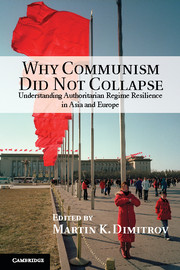Book contents
- Frontmatter
- Contents
- Tables and Figures
- List of Contributors
- Acknowledgments
- Abbreviations
- Part I Reform and Resilience
- Part II Ideology and Resilience
- Part III Contagion and Resilience
- 5 Bringing Down Dictators
- 6 The Dynamics of Diffusion in the Soviet Bloc and the Impact on Regime Survival
- Part IV Inclusion and Resilience
- Part V Accountability and Resilience
- Miscellaneous Bibliography
- General Bibliography
- Index
- References
5 - Bringing Down Dictators
Waves of Democratic Change in Communist and Postcommunist Europe and Eurasia
Published online by Cambridge University Press: 05 August 2013
- Frontmatter
- Contents
- Tables and Figures
- List of Contributors
- Acknowledgments
- Abbreviations
- Part I Reform and Resilience
- Part II Ideology and Resilience
- Part III Contagion and Resilience
- 5 Bringing Down Dictators
- 6 The Dynamics of Diffusion in the Soviet Bloc and the Impact on Regime Survival
- Part IV Inclusion and Resilience
- Part V Accountability and Resilience
- Miscellaneous Bibliography
- General Bibliography
- Index
- References
Summary
It was amazing that the “Serbian revolution” unfolded in such a velvety, Czech way.
We Children of 1968 Have Worthy Children
There are no miraculous events here, but many years of concerted action.
CLUSTERED COLLAPSE
Why did communism end in some countries, but not in others? The purpose of this volume is to present a range of specialists in both former and more durable communist regimes in order to provide answers to this question. The usual approach in explaining variations in political outcomes, such as regime durability and departure, is to treat countries as separate units and compare them with one another – through either the use of case studies or more quantitative approaches – in order to assess the explanatory power of rival hypotheses. Although a perfectly logical way to proceed and one that has certainly served the test of time, such an approach may not always be warranted. This is particularly the case when there are reasons to think that political outcomes in different countries might be connected to one another. In this situation, the assumption of separate political trajectories is problematic; international and transnational influences must be taken into account; and methodologies need to be readjusted to recognize the interlinked nature of political change.
- Type
- Chapter
- Information
- Why Communism Did Not CollapseUnderstanding Authoritarian Regime Resilience in Asia and Europe, pp. 123 - 148Publisher: Cambridge University PressPrint publication year: 2013
References
- 2
- Cited by



